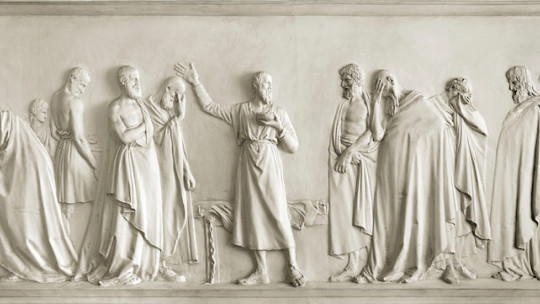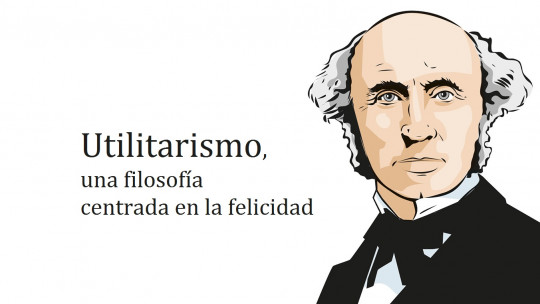Ethics and morality are elements that deeply influence our behavior, and on which philosophy and the different sciences that analyze human behavior have attempted to reflect and investigate. We limit our behavior in pursuit of the possibility of being able to live with others. Why do we act the way we act?
There are multiple lines of philosophical thought that have raised questions regarding these issues and that have explored the concepts developed in order to give them an explanation. One of them is that of Immanuel Kant’s categorical imperative which we are going to talk about in this article.
Kantian morality
Before seeing what the categorical imperative is, it is necessary to make a brief comment on some of the aspects of Kant’s conception with respect to morality. Immanuel Kant was a theologian deeply concerned about this issue, in a time of great contrasts between ideological currents with different points of view regarding the way to behave and direct conduct.
The author considered morality as a rational element, far from empirical elements and based on universal ethics. For Kant, the moral act is one that is performed as a duty, as an end in itself: the moral act is one in which one acts based on reason, not self-love or interest. On the contrary, those that are carried out by chance, with interest or as a means to achieve or avoid other elements will not be such.
Moral action is based on good will. The act itself must be seen in its subjective sense to be valued as moral or immoral. The moral act seeks the happiness of others, which in turn allows for one’s own by being part of humanity, instead of trying to satisfy desires or flee from pain and suffering. To be moral one requires being free, in a sense that Kant relates to the possibility of transcending one’s own desires and imperatives to achieve transcendence.
With regard to concepts such as good and evil, widely linked to morality, Kant considers that acts are not good or bad in themselves but rather that it depends on the subject who carries them out. In fact, what is moral is not the act itself but the purpose behind it : He who deviates from the moral laws that govern him will be bad, subordinating his universal moral motivations to those of personal interest and his own sensitivity, while the good is he who follows morality as a universal law in his life and on the basis of she carries out and fulfills her wishes based on said morality. A core concept in his concept of morality is the idea of the categorical imperative.
Kant’s idea of categorical imperative
At some point we have all done or tried to do the right thing, or felt bad for not doing it. Kant’s concept of the categorical imperative is deeply linked to this fact.
A categorical imperative is understood to be the act or proposition that is carried out because it is considered necessary, without there being any more reasons to be carried out than said consideration. They would be constructions that are carried out in the form of “I must”, without being conditioned by any other consideration, and They would be universal and applicable at any time or situation. The imperative is an end in itself and not a means to achieve a certain result. For example, we can generally say “I must tell the truth”, “human beings must be supportive”, “I must help others when they are going through a bad time” or “we must respect others”.
The categorical imperative does not have to have an additive meaning, but can also be restrictive. That is, it is not only about us doing something, but it can also be based on not doing it or stopping doing it. For example, most people do not steal or harm others because they consider such an action something negative per se.
The categorical imperative It is an eminently rational construct , which aims to treat humanity (understood as a quality) as an end and not as a means to achieve something. However, these are imperatives that are difficult to see in real life in this sense, since we are also very subject to our desires and we guide our actions based on them.
Categorical Imperative and Hypothetical Imperative
The notion of a categorical imperative is based mainly on the fact of doing something for the sake of doing it, the act being an end in itself and without any conditions. However, although we can find some exponents of the categorical imperative in real life, most of our actions are motivated by aspects other than the fact of doing them.
For example, we study to pass an exam or we go shopping to feed ourselves. I go to class to learn, I work to fulfill my calling and/or earn a salary, or we exercise to relax or gain physical fitness.
We are talking about what the same author would consider a hypothetical imperative, a conditioned demand that is used as a means to an end. This is not a universal proposition but rather relative to the situation we are facing, and it is the most common type of imperative even when we believe that we are doing it as an end in itself.
It must be taken into account that many of the imperatives that govern us can be categorical or hypothetical depending on how they are posed. I can not steal because it seems wrong to me or I can not steal because I am afraid of being caught and taken to jail. In this sense, it is not the action itself but the presence or absence of a motive beyond morality that leads to the action that will cause us to be faced with one type of imperative or another.
Kantian formulations
Throughout his work, Kant generates different formulations that summarize the moral mandate behind the categorical imperative. Specifically, five major complementary and linked formulas stand out. They are based on the existence of maxims that guide our conduct, these being subjective when they are only valid for the will of the person who possesses them or objective if they are valid for both one and others, having the same value for everyone regardless of who they are. perform. The formulations in question are the following.
In conclusion, these formulas propose that we act based on universal moral values or that we rationally consider that we should all follow, self-imposed by our own reason and considering these values an end in themselves. Following these maxims we would act based on our categorical imperatives seeking the happiness of others and acting morally, in such a way that we would also live doing what is right and obtaining gratification from this fact.









